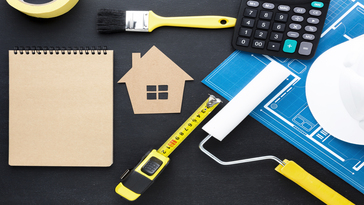Home renovations can transform any space into something special. Whether it’s updating a tired kitchen or adding a new room, the possibilities are endless when it comes to improving your home.
But for many homeowners, funding these projects can be a challenge. That’s where financing options like loans come into play, offering a solution to bring your vision to life without draining your savings.
If you’ve been considering home renovations, keep reading. We’ll explore how loans can help turn your ideas into reality, and give you the insights you need to get started.
Why Consider Home Renovations?
Before diving into financing options, let’s first consider why home renovations are so appealing. A well-renovated home can increase property value, make your living space more comfortable, and even reduce ongoing maintenance costs.
Whether you’re looking to enhance curb appeal, update your kitchen, or revamp your bathroom, home renovations can significantly improve your quality of life.
Types of Home Renovations You Can Finance
There are several types of renovations that homeowners in South Africa commonly choose to finance. These include:
-
Kitchen Renovations: The kitchen is often considered the heart of the home. Whether it’s adding modern appliances, upgrading countertops, or creating an open-plan design, renovating your kitchen can not only improve your home’s functionality but also its resale value.
-
Bathroom Renovations: Outdated bathrooms can feel cramped and uncomfortable. Home renovations in the form of bathroom upgrades can turn a dull space into a luxurious retreat. This might include installing new fixtures, adding a soaking tub, or improving the layout.
-
Room Additions: If your family is growing or you simply need more space, adding a room can be a game-changer. From extra bedrooms to home offices, room additions can increase both the space and value of your property.
-
Exterior and Landscaping Renovations: Enhancing your home’s curb appeal is a fantastic way to make a great first impression. Whether you’re installing a new driveway, adding a garden, or painting the exterior, home renovations that focus on your home’s exterior can make a big difference.
-
Energy-Efficient Upgrades: As utility bills continue to rise, energy-efficient upgrades have become a smart choice for many homeowners. From solar panels to insulation improvements, these renovations can save money in the long run while helping you do your part for the environment.
Financing Your Home Renovations
In South Africa, financing home renovations is a common practice. There are a variety of options available to homeowners who want to invest in their properties. Let’s explore some of the most popular ways to finance your renovation project.
1. Home Renovation Loans
A home renovation loan is a straightforward way to finance home renovations. These loans are specifically designed for property improvements and typically offer competitive interest rates. In South Africa, many banks and financial institutions offer home renovation loans, which are typically secured against the value of your home.
The amount you can borrow depends on the value of your property and your financial profile.
2. Personal Loans
Personal loans are another popular option for financing home renovations. While they don’t require collateral, they often come with higher interest rates compared to home renovation loans. However, personal loans can be a good choice for smaller projects or when you don’t want to tie up your property as collateral. Many South African banks offer personal loans with flexible repayment terms.
3. Home Equity Loans
A home equity loan allows you to borrow against the equity in your property. This type of loan is often used for large home renovations because it offers a larger loan amount and lower interest rates than personal loans. However, because the loan is secured against your home, there’s a risk of losing your property if you fail to repay.
4. Credit Cards
For smaller-scale home renovations, using a credit card might be a feasible option. While this method can be convenient, it’s important to manage your payments carefully. High-interest rates can quickly accumulate if you don’t pay off the balance in full each month. Therefore, it’s best used for minor repairs or projects that can be completed in a short time frame.
5. Government and Subsidy Programs
In South Africa, there are various government programs and subsidies designed to help homeowners with home renovations. These programs are usually aimed at low-income families or specific renovation types, such as energy-efficient improvements. It’s worth researching local government options to see if you qualify for any assistance.
Pros and Cons of Financing Home Renovations
Like any financial decision, taking out a loan for home renovations comes with its benefits and challenges. Here are some factors to consider:
Pros:
- Immediate Access to Funds: Financing allows you to start your renovations sooner rather than waiting until you can afford to pay for the entire project upfront.
- Potential Increase in Property Value: Many renovations can boost the resale value of your home, potentially allowing you to recover your investment when it’s time to sell.
- Flexible Loan Options: With several financing options available, you can find a loan that suits your needs, whether it’s a home renovation loan or a personal loan.
Cons:
- Debt and Repayment: Taking out a loan means that you’ll need to repay the amount borrowed, often with interest. This can put a strain on your finances, particularly if you’re not able to stick to your repayment schedule.
- Risk to Your Property: If you opt for a secured loan, such as a home equity loan, there is a risk of losing your home if you fail to repay the loan.
- Over-Borrowing: It’s easy to get carried away with financing options, leading to overspending on renovations. It’s important to have a clear budget and stick to it.
Tips for a Successful Renovation with Financing
-
Set a Realistic Budget: Before committing to any loan, carefully assess the cost of your renovation. Factor in all expenses, including labor, materials, and any unexpected costs that may arise.
-
Get Multiple Quotes: Shop around and get quotes from several contractors to ensure you’re getting the best deal. This can help you avoid overspending and stay within budget.
-
Plan for the Long-Term: While home renovations can be exciting, it’s important to think about the long-term impact of your investment. Will your renovations enhance your home’s value, or are you simply spending for personal enjoyment?
-
Don’t Overextend Yourself: Make sure you can comfortably afford the loan repayments before committing. It’s tempting to take out a larger loan, but it’s important to keep your finances manageable.
Conclusion
Home renovations offer homeowners in South Africa the opportunity to improve their living spaces, whether for personal enjoyment or to increase property value. With the variety of financing options available, including home renovation loans, personal loans, and credit cards, transforming your home is more accessible than ever.
However, it’s important to carefully consider your financing options and budget to ensure your renovation project is a success. By taking the time to plan and choose the right loan, you can achieve your dream home and enjoy the results for years to come.





